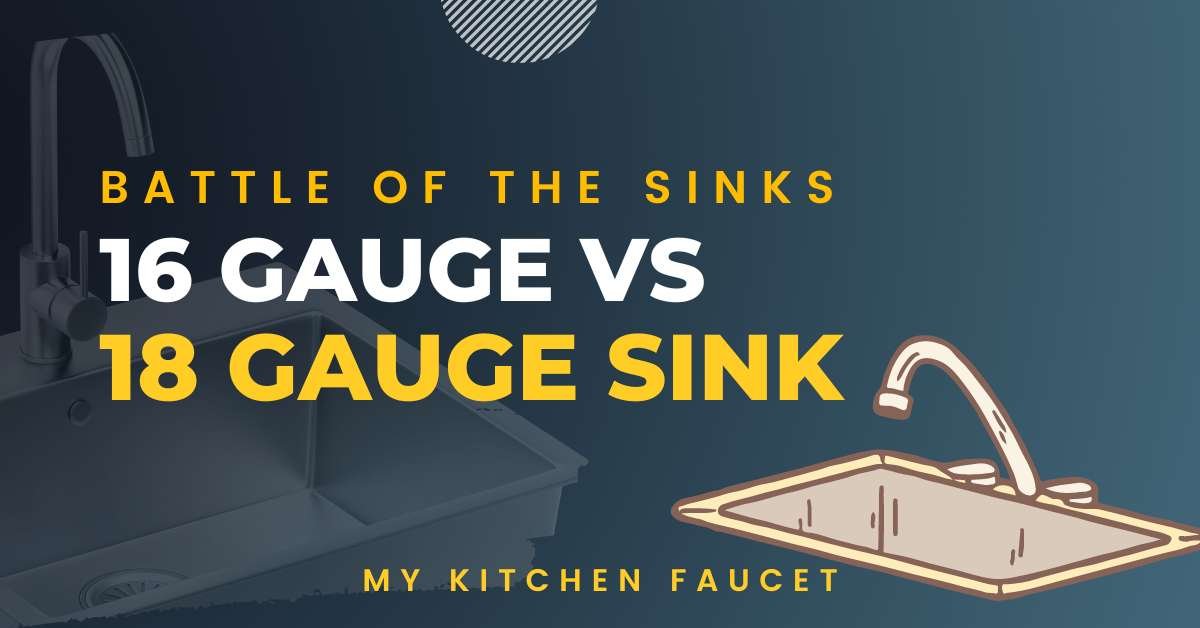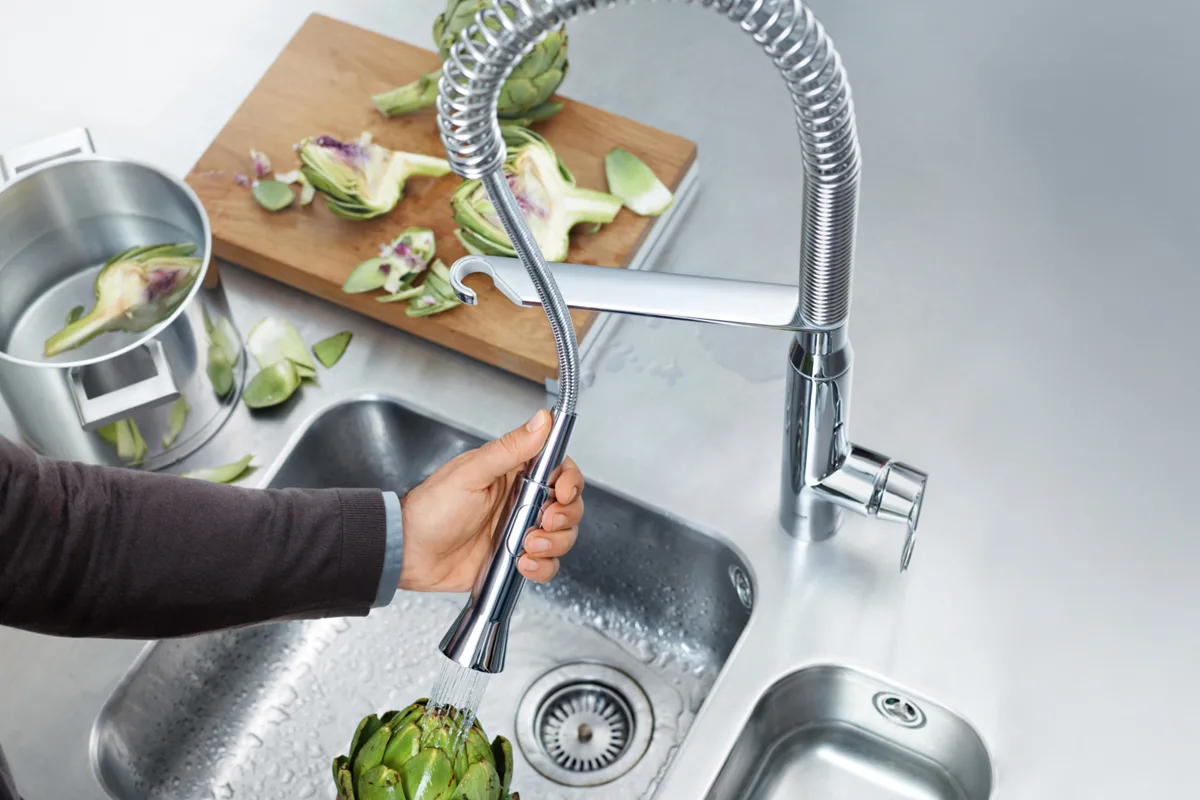16 gauge sink vs. 18 gauge is an endless debate. Choosing between sinks that are 16 gauge or 18 gauge might be difficult for many homeowners.
Perhaps for most people, the gauge number is a useless thing. They never even bother to know it as they think it’s not making sense. When selecting the right material for your kitchen, there are several things to keep in mind. These elements include dimensions, thickness, cost, and suitability.
Although there are many possibilities for sink materials, stainless steel sinks are the most common and widely used option for residential and commercial settings.
In this post, we’ll provide you with all the details you need to know about things to consider while choosing the proper gauge for your kitchen and house.
What Is the gauge number?

While determining the thickness of any sink gauge, you need to know its number. The gauge number refers to the thickness of the stainless steel material used in making the sink. The thickness of stainless steel sink gauges usually ranges from 18 to 23.
Similarly, the lower the gauge number, the thicker the material is.
Two basic types of gauges:
Thick gauges:
The stainless steel gauges range from 0.0625 to 0.0500 inches and are considered thicker. They are more costly. Many home renovation advisers recommend 16 to 18 gauges for optimal durability, while pricing might vary based on material, quality, etc.
The lifetime rate increases proportionately with thickness, but millions of money can get something special, like solid gold.
Thin Gauges:
Stainless steel is a reliable and cost-effective material for kitchens. However, the thinner gauges have inferior strength compared to thicker gauge materials. They are less successful at keeping knocks or dents out of your sink.
For instance, if not handled carefully, some models manufactured of 22-gauge sheathing may dent easily. The least-priced kitchen sinks are made of 22-gauge stainless steel with a thickness of 0.0312 inches.
This grade of stainless steel kitchen sink is more prone to bending, denting, and dents. The best option might not be a 22 gauge if you want a strong and durable sink gauge.
When your budget is tight and you do not want an expensive sink, a 20-gauge is a better alternative, which is 0.0375 inches. For tiny bar sinks, cabins, or recreational vehicles, 22-gauge steel sinks are ideal.
16 gauge vs 18 gauge sink, which one is better:
We recommend you buy the 16 gauge sink without hesitation. Perhaps not be confused between the pricing between 16 and 18 gauges. A 16 gauge sink is 0.0625′′ thick, but an 18 gauge sink is just 20% thinner at 0.05′′ thick.
Although there is no noticeable difference between the two gauges, the 16 gauge is “better” due to its thickness and durability.
Thickness is the necessary quality for a sink gauge:
The thickness of a gauge is necessarily a quality that matters a lot. It represents the doping and structural integrity of the sinks. Apart from thickness, many features help access a gauge’s quality, like its finish, consistency, and straightness.
Perhaps a stronger or thicker kitchen sink gauge provides better drainage and prevents clogging. Thicker gauges are the long-lasting options.
Why is a thicker gauge always a better option?

Here are the quick reasons you need to know about a thicker sink gauge:
1. Improved noise dampening
2. Less susceptibility to denting and bowing
3. Strength and durability
Sink experts usually concur that a stronger gauge can assist in preventing denting and bending.
Moreover, thicker gauges have less noise for trash disposals, and anything dropped or put into the sink.
Many sink manufacturers use coatings and cushions to insulate and soundproof the underneath of the sink. This will undoubtedly contribute to the sink being quieter, but the bulk of a thicker steel sink will result in considerably superior damping properties.
A thicker sink gauge is a safe option that is long-lasting as well. Imagine you accidentally dropped a butcher knife or anything hard into the sink.
The thicker kitchen sink will be less likely to dent, and it may prevent the sheet metal from being punctured because it is stronger.
That’s how a thick gauge is a one-time investment to enjoy a long-lasting experience.
16 gauge sink vs. 18 gauge sink, quick difference:
Here’s the short and comprehensive difference between 16 gauge sink vs. 18 gauge sink.
| 16 gauge sink | 18 gauge sink |
|---|---|
| Thickness is 0.0625 inches thick, which is considered very thick | 0.0500 inches thick, which is thinner then 16 gauge sink |
| Long lasting and durable | Less durable and long-lasting |
| Very expensive | Less expensive |
Advantages of 16 gauge steel sink
Even though there is less difference between the numbers but 16 gauge sinks offer 25% more thickness than 18 gauge sinks. Apart from being thick, it offers the following benefits also:
- It is stain resistant
- It is heat resistant
- It is dent resistant
- It is long-lasting
- Ccratch-resistant.
In short, a 16 gauge sink is ideal for an expensive, luxurious, beautiful kitchen. However, it’s expensive, but its cost is well worth it and proves to be a one-time investment by its long lastness.
Tips for making your kitchen sink more beautiful:
The most durable and expensive kitchen sink can last up to 30 years. But if you want to increase the life of your investment, you need to take care of it.
Here are a few tips that work for kitchen sinks.
1. Prevent rusting:
Wash your sink immediately after ashing dashes; otherwise, the debris or bacteria from leftover food can cause rusting or permanent staining. If you see any rust or stain from hard water, wrap it with any mild detergent.
2. Scrubbing:
You can scrub your sink with vinegar once a week. This hack will restore the sink’s beauty and shine.
3. Cleaning:
Use comet cleaner for buffing and scuffs offing scratches.
To sum up:
18 gauge is ideal for stainless steel kitchen sinks. Of course, 16 gauge is the finest option, but both 16 and 18 gauge will offer the best overall performance, cost, and pleasure. Higher gauges like 20, 22, and 24, much thinner, will cause trouble.
According to our thorough market investigation, the idea that the lowest gauge sinks are the most expensive is untrue as 16 and 18 gauge sinks are similarly priced.
But the only difference is their thickness. Thick gauges are sturdy, durable, and long-lasting. While the other 18 one is less in thickness compared to the 16, so it’s not that durable.
FAQS:
Is a 16 gauge considered good for the kitchen sink?
Yes, the 16 gauge sink is considered the thickest stainless steel gauge. It’s the best gauge size to consider when deciding on the sink for your kitchen. The thick alloy will not cause the problem of denting and bowing. You should buy a 16 gauge kitchen sink for long-lasting results.
Which stainless steel gauge number is better to use?
Any number from 16 to 20 is an ideal gauge choice. If you want an inexpensive option, consider purchasing a 20-gauge number. Otherwise, 16 gauge is the most ever-lasting sink gauge option, but its costs are quite high.
Which gauge number is thicker, 18 or 20?
The lower the number, the stronger and thicker the gauge is. So 18 gauge is a stronger metal than 20, which is brittle and has less structural support.
How to protect stainless steel from rusting?
You can protect your stainless steel sink from rusting with little maintenance. After each usage, thoroughly rinse or wash the fixture by removing any food particles. Completely avoid putting bleach on the sink, which will gradually reduce its efficiency.
Do not leave iron cookware for a prolonged period in your sink. It will cause rusting and gradually decrease the life of your cookware.
Moreover, you can use lemon and soda to wash your sink but just once a week. This home remedy will remove all the dirt particles from your sink and can enhance its life.
Bottom lines:
We hope the 16 gauge sink vs. 18 gauge debate ends after reading this article. We have explained each aspect of gauge number in detail.16 and 18 gauge numbers are considered good for kitchen sinks.
The only difference is their thickness, price, and durability. However, the differences are very slight. Any sink having a thickness of more than 10mm is considered safe and normal. 10mm gauge sink is probably insufficient, and they will dent easily.
Apart from it, pricing is another essential factor. If your budget is high, we highly recommend you buy a 16 gauge sink for your kitchen.
They are durable, luxurious, and packed with premium features. If you don’t want to spend a large amount, then 18 gauge is okay for a stainless steel sink, and you can increase its life with routine maintenance.





